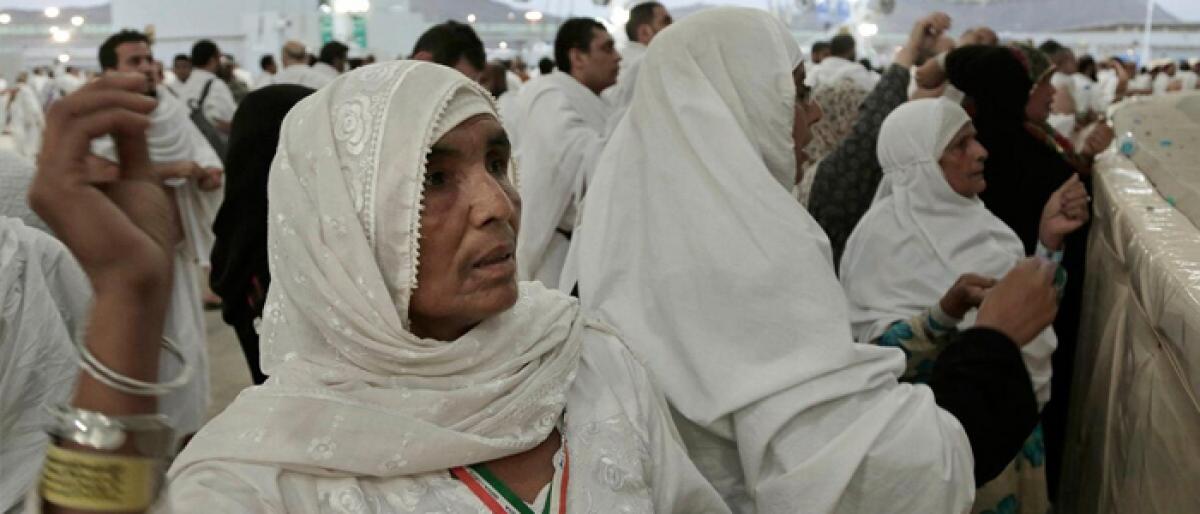Women stay away from Haj without mehram

In 2014, Saudi Arabia updated its earlier rule and allowed women above 45 years to go in groups on Haj pilgrimage And, after three years, in 2018 India too passed a resolution to let women go on Haj without a male escort Women over the age of 45 will no longer have to be accompanied by a mehram, or close male relative, such as a father, husband, brother or son, the governmentadded in the countr
Hyderabad: In 2014, Saudi Arabia updated its earlier rule and allowed women above 45 years to go in groups on Haj pilgrimage. And, after three years, in 2018 India too passed a resolution to let women go on Haj without a male escort. Women over the age of 45 will no longer have to be accompanied by a mehram, or close male relative, such as a father, husband, brother or son, the government-added in the country’s first Haj policy.
This year more than 47 per cent of the total number of pilgrims are women, which is the highest ever representation of women in Haj from India out of which, around 1,300 women travelled in groups without mehram. Talha Jabeen, social activist from Hyderabad, says that, “Haj is a beautiful and sacred journey for the almighty adding up disobedience is basically not appreciated. It is the maulana’s and mufti’s who should decide and declare the laws of the religion rather than the government of any country.”
She adds, “The way prime minister highlighted it made it more controversial though this practice was very much in progress in many countries. The aged women, or who are alone, can perform Haj. Women above 45 can go on Haj in special cases accompanied by a male from an individual’s family just to be on more secure and safer side. If the Muslim women from Telangana didn’t go it’s their choice and convenience.”
Special officer Telangana Haj Committee Prof. SA Shukoor, shares, “No application has been submitted without mehram from here.” About his take on this practice he states, “We implement rules which are created by the government. All state Haj Committee has to work according to the Central Haj Committee Act 2002, which we are doing. Whatever rules are given by the Central Haj Committee we have to implement them.”
Asima Sultana (name changed) who conducts Ijtema’s (discourses on Islam) in Hyderabad states religious reasons, “It is basically forbidden by Islamic law. It is clearly mentioned in the Hadeeth that women cannot travel without mehram. It is very uncomfortable for women to stay on the open lands of Arafat and Muzdalifah on their own. On the other hand, millions of people make it very uncomfortable and difficult.”
It might also be too early to judge why women groups did not go to Haj from Telugu states as shared by a few Hajis. Ignorance of the policy or reluctance to take the journey to Mecca which is over crowded with Haj pilgrims are the other reasons that may have been instrumental in women staying away from going on their own.
“I performed Haj in 2014 along with my parents. I never used to go out in Mecca alone because the country was new to me and I was scared. When we went to Mina, I used to get confused to reach my tent. And on mount Arafat we had to stay on open land and from there we went to Muzdalifah to collect pebbles and slept in the open, which was fine because I was with my family,” says Naseem Unissa, from Medak district.
“It’s a good thing that they have given the opportunity for every woman. When today women are in every field, why can’t they go on Haj on their own? I think many people might not be aware of the new policy or they might be pressurised by society - these might be the two reasons that no women’s group went from our Telugu states. Maybe they will learn from other’s experience and venture out the next year,” says Kahekashan from Bowenpally, Hyderabad, who performed Haj in 2012.















